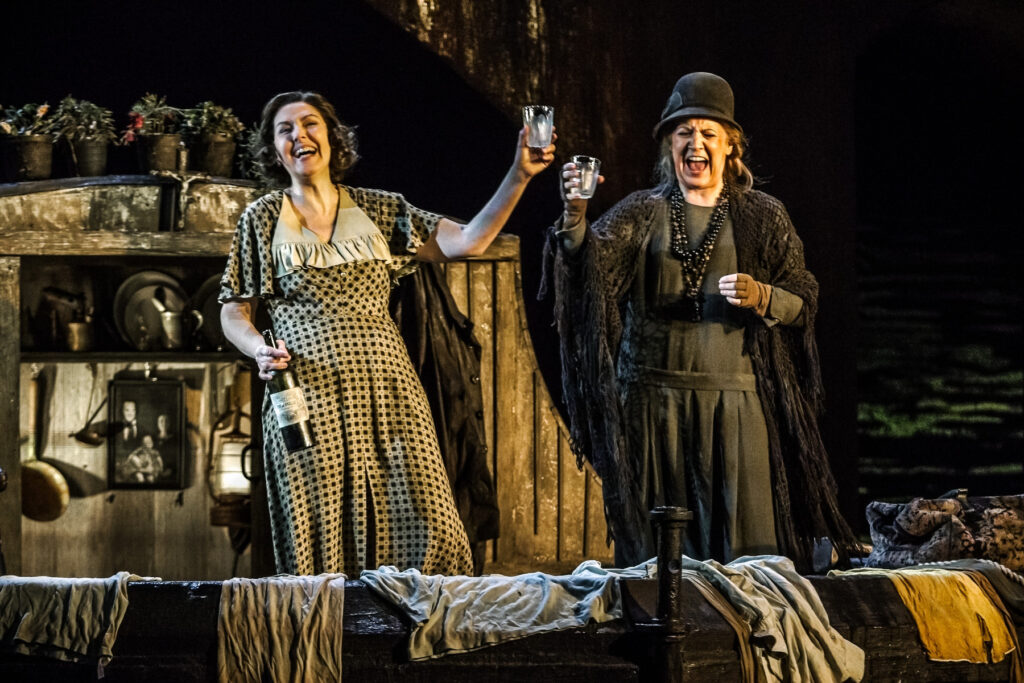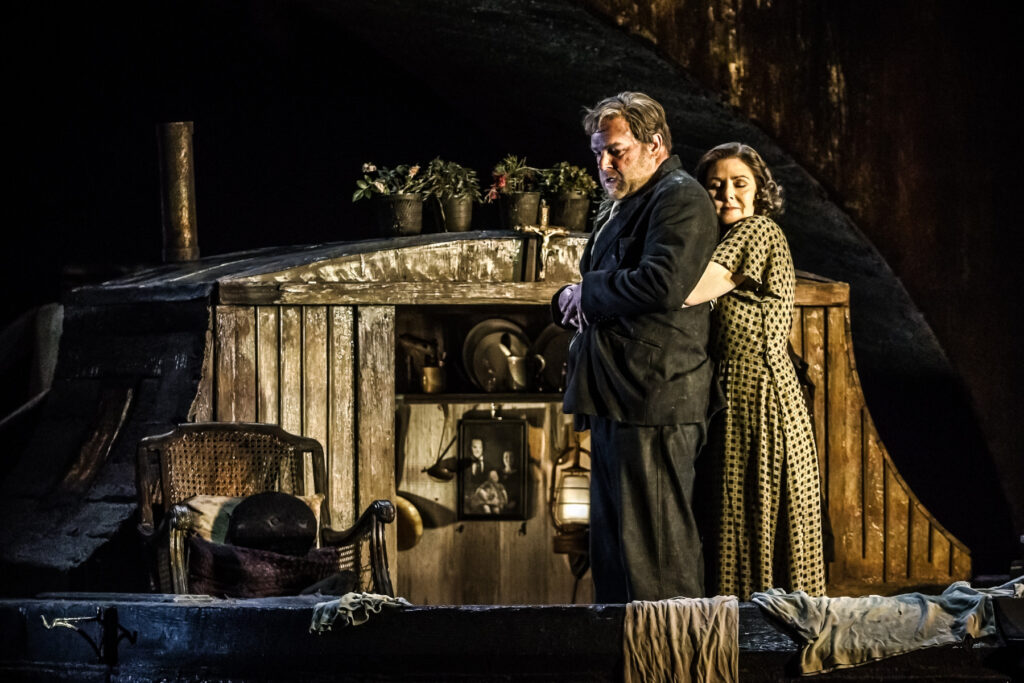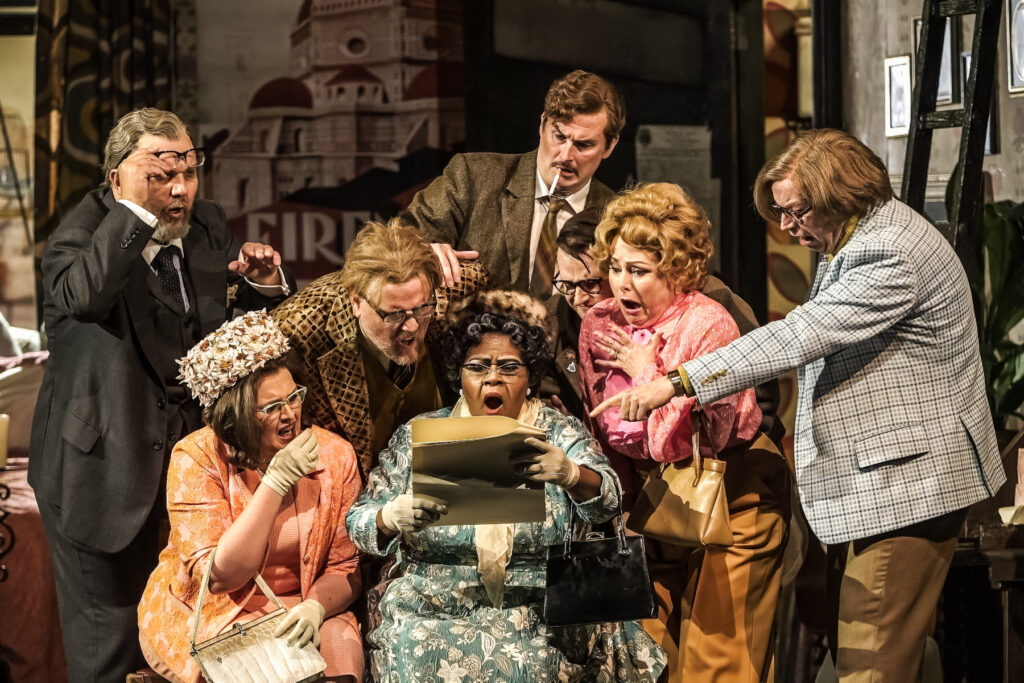Within the last year or so Welsh National Opera has produced some remarkable productions including two unforgettable stagings of Candide and Death in Venice. Now, Puccini’s Il trittico has begun its summer season, a co-production with Scottish Opera that was originally directed by Sir David McVicar last year in Glasgow. Its recent opening in Cardiff marks the trilogy’s first appearance in the company’s history and is in the very capable hands of Greg Eldridge. With such an excellent staging and first-class performances to boot, enhancing an already outstanding reputation, it seems inconceivable that WNO is facing an uncertain future owing to public funding cuts. Only hours before curtain-up members of the WNO chorus were leafletting members of the public to apprise them of a national institution in jeopardy.
Just over a century ago in 1918, Puccini’s triptych debuted at New York’s Metropolitan Opera. Considering the relative rarity with which these three one acters are staged as a group, it is especially rewarding to see them presented across one evening (Puccini was adamant they should be performed together) when one can appreciate the connections between them. At first glance, there may be only a tenuous link between these snapshots of humanity. But common to each of the works is a narrative of unfulfilled dreams and the concealment of death: Il tabarro ends with a crime of passion (hidden under a cloak), Suor Anglica laments a dead son and Gianni Schicchi centreson the cover up of a dead relative.

Presiding over the designs for all three works is designer Charles Edwards who adopts a singular approach, each set addressing a distinctive atmosphere, period and occupying sumptuous detail. That’s very much in evidence in Il tabarro’s claustrophobic staging; a riverside barge nestling under a low bridge by a quayside, the whole atmospherically lit by Ben Pickersgill. Shadows and silhouettes bring their own foreboding and mirrors the mood of barge-owner Michele whose younger wife Giorgetta is making hay with the stevedore Luigi. The ebb and flow of Puccini’s score is a perfect fit for both the watery locale and the slow marital breakdown that follows the death of the couple’s child.
From murky tints we move to a light-filled lobby in Suor Angelica’s convent, a non-specific location somewhere in the 1950s. And it’sevident from the opening scene when a nun removes a young mother’s illegitimate infant that McVicar is referencing the Magdalene Laundries in Ireland where fallen women were sent until as recently as the 1990s. As before, there’s much to admire in the detail, including an anteroom-cum-apothecary that points to Angelica’s healing gifts as well as providing the poison she will use to take her life. A portrait of a pope and a saint look down from grimy walls over servants and nuns, all appropriately attired by Hannah Clark with an eye to their rank within the community.

Then, it’s a burst of colour for Gianni Schicchi where medieval Florence is updated to a riotously crowded 1970s bed-sitting room occupied by the ruthlessly avaricious and Will-seeking relatives of the just-dead, but still-warm, Buoso Donati whose fortune is rumoured to benefit a monastery. It’s a collection of brilliantly caricatured grotesques that could have been drawn from Fawlty Towers or Abigail’s Party. Whether looking for Buoso’s missing Will, the undressing of Buoso and dressing of Schicchi, the comic routines are all slickly enacted.
So what of the singing? Principal honours go to English baritone Roland Wood and Greek soprano Alexia Voulgaridou, husband and wife in Il tabarro, and individually as Gianni Schicchi and Suor Angelica. Wood is every inch the world-weary cuckold Michele, his sense of resignation and dour manner looms over his barge workers. But there’s an appealing warmth to his singing that draws our sympathy, sharper tones emerging only as he discovers his wife’s betrayal. As Giorgetta, Voulgaridou brings a melting lyricism to her dreams of a more settled life and adds raw energy to her impassioned duet with tenor Leonardo Caimi. What his Luigi lacks in charisma, he more than compensates with vocal virility, his ringing tones gloriously ardent. Elsewhere, there’s impressive support from Alison Kettlewell as the bag lady Frugola, who brings light relief when singing of her cat Ali Baba. Wojtek Gierlach draws the ear and eye as Talpa with his merry drinking song, and Daniel Norman’s Tinca makes the most of his cameo role.

Voulgaridou returns to the stage to give a comprehensive portrayal of the humble, repentant Sister Angelica, whose dreams of meeting her son are finally achieved in her dying moments. Her grief on hearing of his death is followed by an ecstatic heavenly encounter that will moisten every eye in the house. We may not be dazzled by an image of the Virgin Mary, but the singing and acting are exemplary. Minor roles are well observed, and making a strong impression is Tichina Vaughn as Angelica’s unforgiving aunt, her rich contralto suitably imperious.
Roland Wood relishes his role as the opportunistic scoundrel Gianni Schicchi andreadily communicates his dislike for Donati’s family. Haegen Lee’s charming Lauretta makes the most of ‘O Mio Babbino caro’, while Oleksiy Palchykov is her nerdy and ardent boyfriend Rinuccio. Amongst other cameos, there’s a wonderfully agile Julian Boyce as Maestro Spinelloccio, and a comic turn from veteran Rebecca Evans as Nella.
At the helm is acclaimed conductor Carlo Rizzi, whose guiding hand ensures keenly responsive playing and well-judged tempi, each work self-contained whether melancholic and yearning, sweetly poignant or comic. All in all, an evening of thoroughly involving accounts, with the WNO orchestra playing Puccini’s music with tremendous affection. In short, sovereign performances from a company whose status as a national treasure needs to be unequivocally championed.
David Truslove
Il trittico
Music by Giacomo Puccini
Libretti – Guiseppe Adami (Il tabarro) & Giovacchino Forzano (Suor Angelica & Gianni Schicchi)
Il tabarro
Georgetta – Alexia Voulgaridou; Michele – Roland Wood; Luigi – Leonardo Caimi; Tinca – Daniel Norman; Talpa – Wojtek Gierlach; Frugola – Alison Kettlewell; Song Seller – Osian Wyn Bowen; Young Lovers – Haegee Lee & Oleksiy Palchikov; Organ Grinder – Paul Jenkins; Stevedores – Rahim El Habachi & Dafydd Weeks; Chorus of Seamstresses
Suor Angelica
Sister Angelica – Alexia Voulgaridou; The Princess – Tichina Vaughn; The Abbess – Sioned Gwen Davies; Sister Genovieffa – Haegee Lee; Mistress of Novices – Helen Jarmany; Novice – Alys Roberts; The Siter Monitor – Sophie Yelland; Sister Osmina – Sarah Pope; Sister Dolcina – Monika Sawa; Infirmary Sister – Alison Kettlewell; 1st & 2nd Alms Sisters – Emily Christina Loftus & Angharad Morgan; 1st & 2nd Postulants – Claire Hampton & Beca Davies; Sister Lucilla – Joanne Boag; Dispensing Sister – Carolyn Jackson
Gianni Schicchi
Gianni Schicchi – Roland Wood; Lauretta – Haegee Lee; Zita – Tichina Vaughn; Rinuccio – Oleksiy Palchikov; Gherardo – Daniel Norman; Nella – Rebecca Evans; Betto di Signa – Benjamin Bevan; Simone – Wojtek Gierlach; Marco – James Cleverton; La Ciesca – Sioned Gwen Davies; Maestro Spinelloccio – Julian Boyce; Ser Amantio di Nicolao – Alastair Moore; Pinellino – Stephen Wells; Gucio – Jasey Hall; Buoso Donati – Paul Jenkins
Original Director – Sir David McVicar; Revival Director – Greg Eldridge; Designer – Charles Edwards; Costumes – Hannah Clark; Lighting – Ben Pickersgill; Movement – Gareth Mole; Chorus & Orchestra of Welsh National Opera; Conductor – Carlo Rizzi
Millennium, Cardiff, Wales, 18 June 2024
Top Image: Alexia Voulgaridou as Sister Angelica (Suor Angelica)
All photos by Craig Fuller